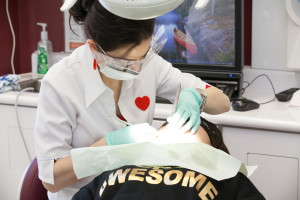Those undergoing cancer treatment have to endure a lot – the path to better health is a difficult one. But there is one aspect of cancer treatment that isn’t widely known: how it negatively affects dental health, including the teeth, gums, salivary glands and other oral tissues.
When there are pre-existing dental issues such as cavities, abscesses, or gingivitis, the infection may become worse during treatment. Gums are more likely to become swollen and painful, with a higher probability of bleeding. Mouth sores may also occur during chemotherapy, and other mouth irritations often worsen.
These side effects can be painful, but there are ways to minimize & prevent them. As October is Breast Cancer Awareness month, we’ve compiled the information you need to know about dental health during cancer treatments.
- Medication: There are specific medications that can ease discomfort and prevent sores – these can be prescribed by a doctor. Pain medicine, such as Tylenol or stronger, may also be used. Always avoid using aspirin or non-steroidal medication (Advil, Motrin) during chemotherapy, as they can cause bleeding. For dry mouth, artificial saliva can be helpful.
- Work with your dental professional: Your dental hygienist and oncologist can work together to make you as comfortable as possible. Continuing with regularly-scheduled dental appointments so your hygienist can monitor your oral comfort and make changes as required is also important.
- Oral health routine: Unless otherwise recommended, continue to gently brush teeth twice per day with fluoride toothpaste, and gently floss once a day. If gums are sore or bleeding, avoid those areas but continue to floss the remainder of your teeth.
- Stay hydrated: Drinking at least eight glasses of water or juices daily can be helpful with many dental side effects including dry mouth, or xerostomia. Using lip balm can help prevent your lips from cracking, and cool mist humidifier will add much-needed needed moisture to your home.
- Food & drink: There are certain foods that you may want to avoid, such as spicy dishes, and anything that is difficult to chew. Tomato and citrus juices will also irritate any mouth sores you may have. Avoiding caffeinated and alcoholic beverages is a smart idea, as they both promote mouth dryness. Some find that chewing sugarless gum or is helpful with their dry mouth.
With these tips and ongoing care from your dental professionals at DentalX, we can ensure that you are as comfortable as possible during treatment. Feel free to share this post during Breast Cancer Awareness month, and help others take the necessary steps to prevent these oral health side effects.

